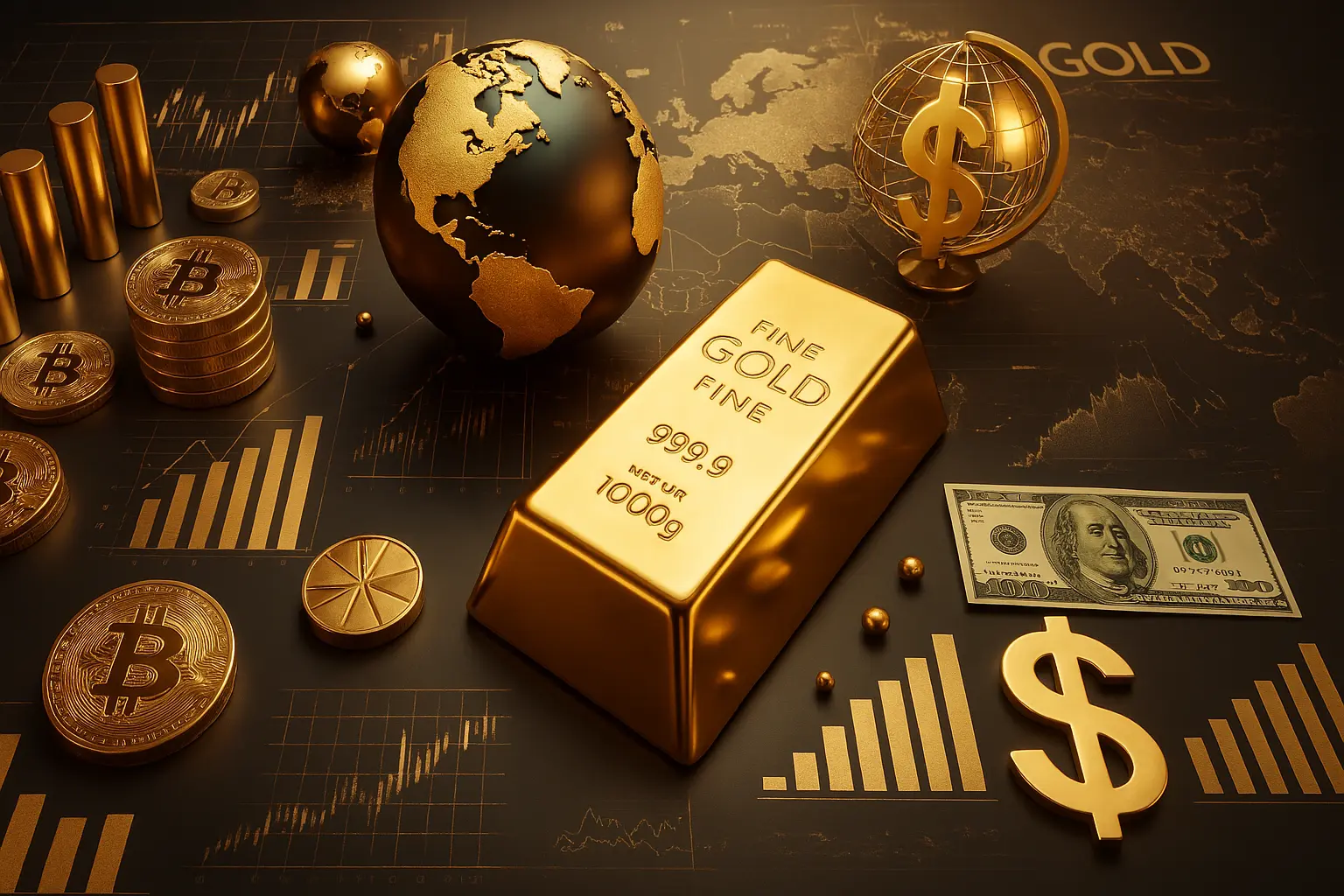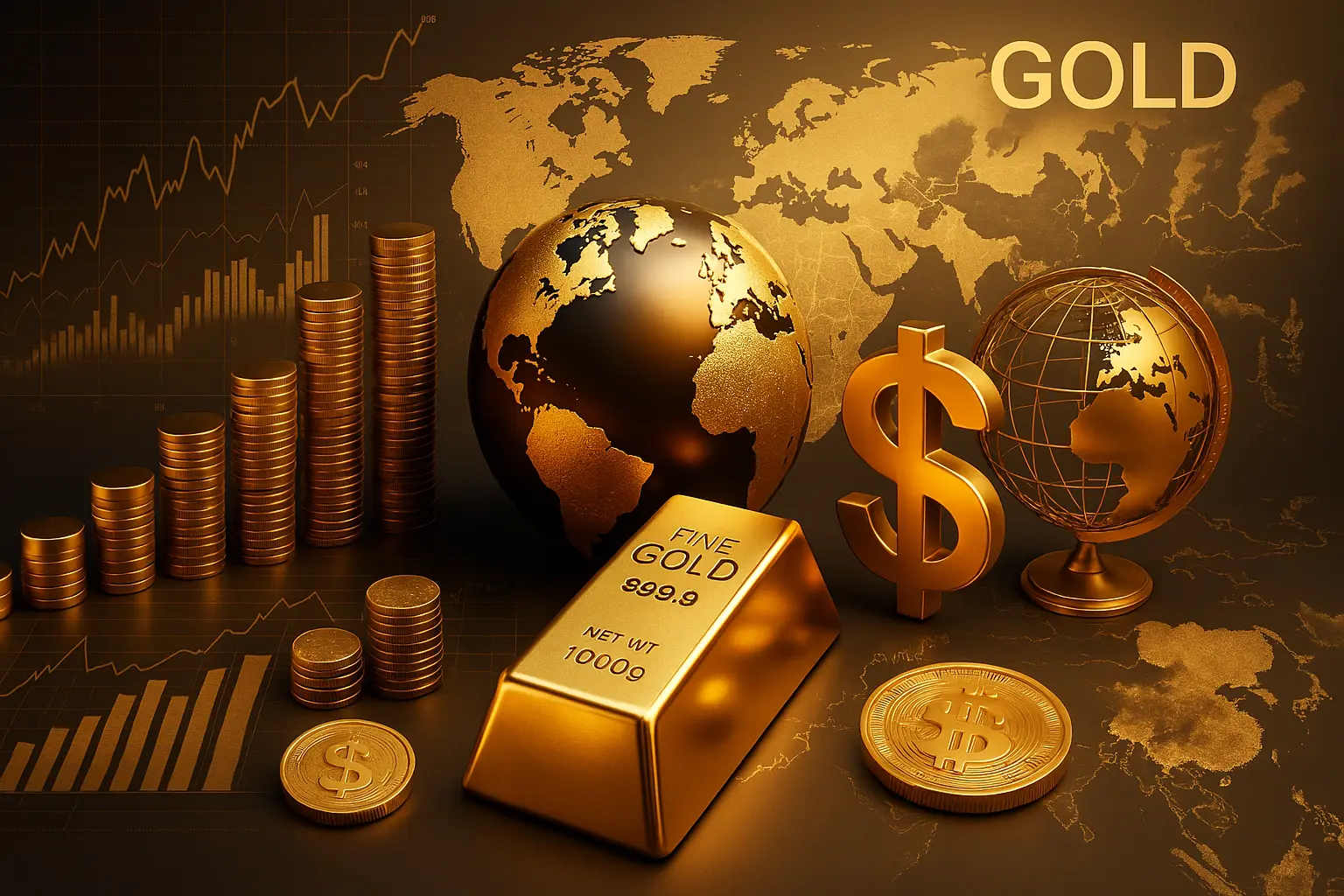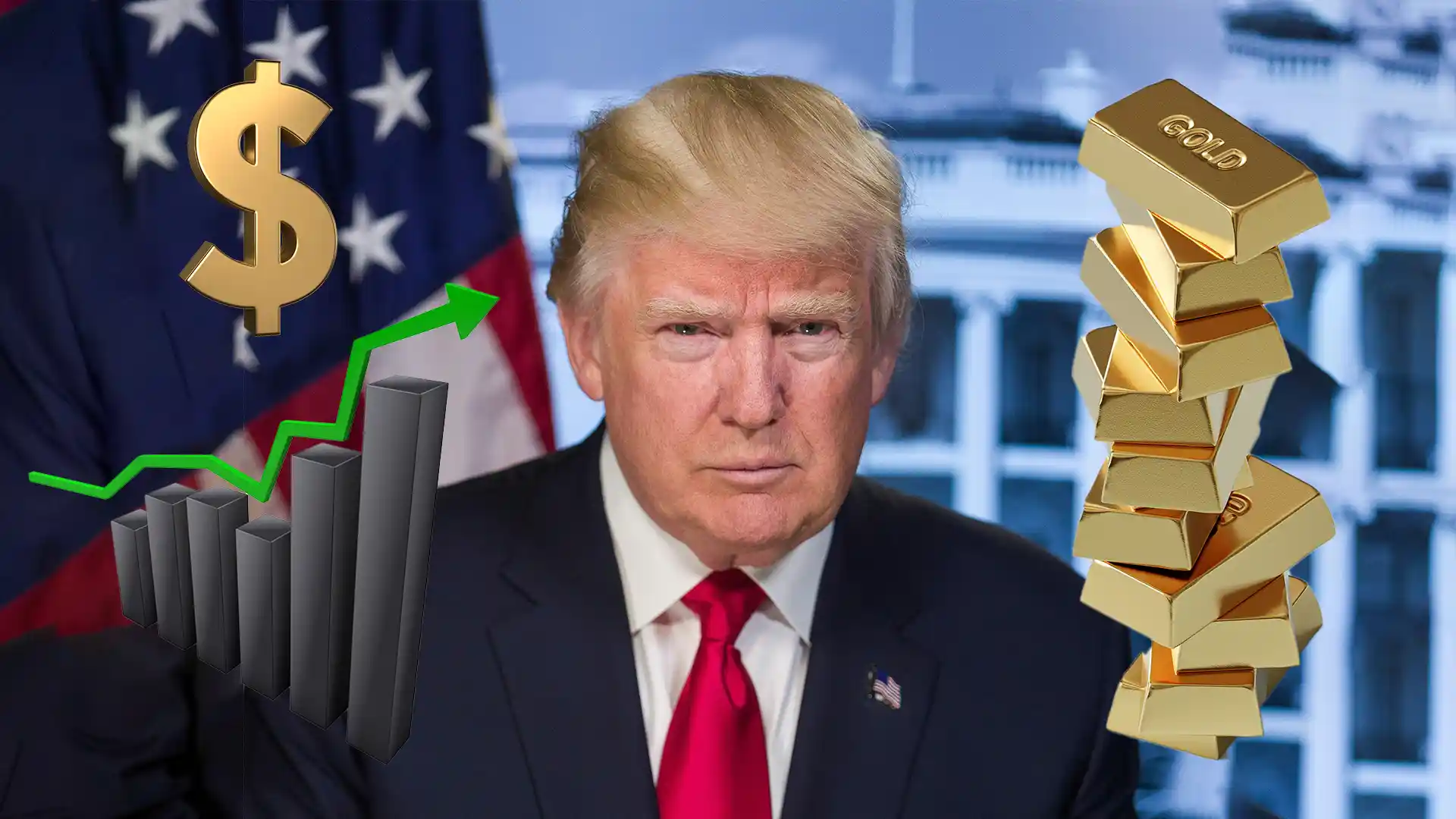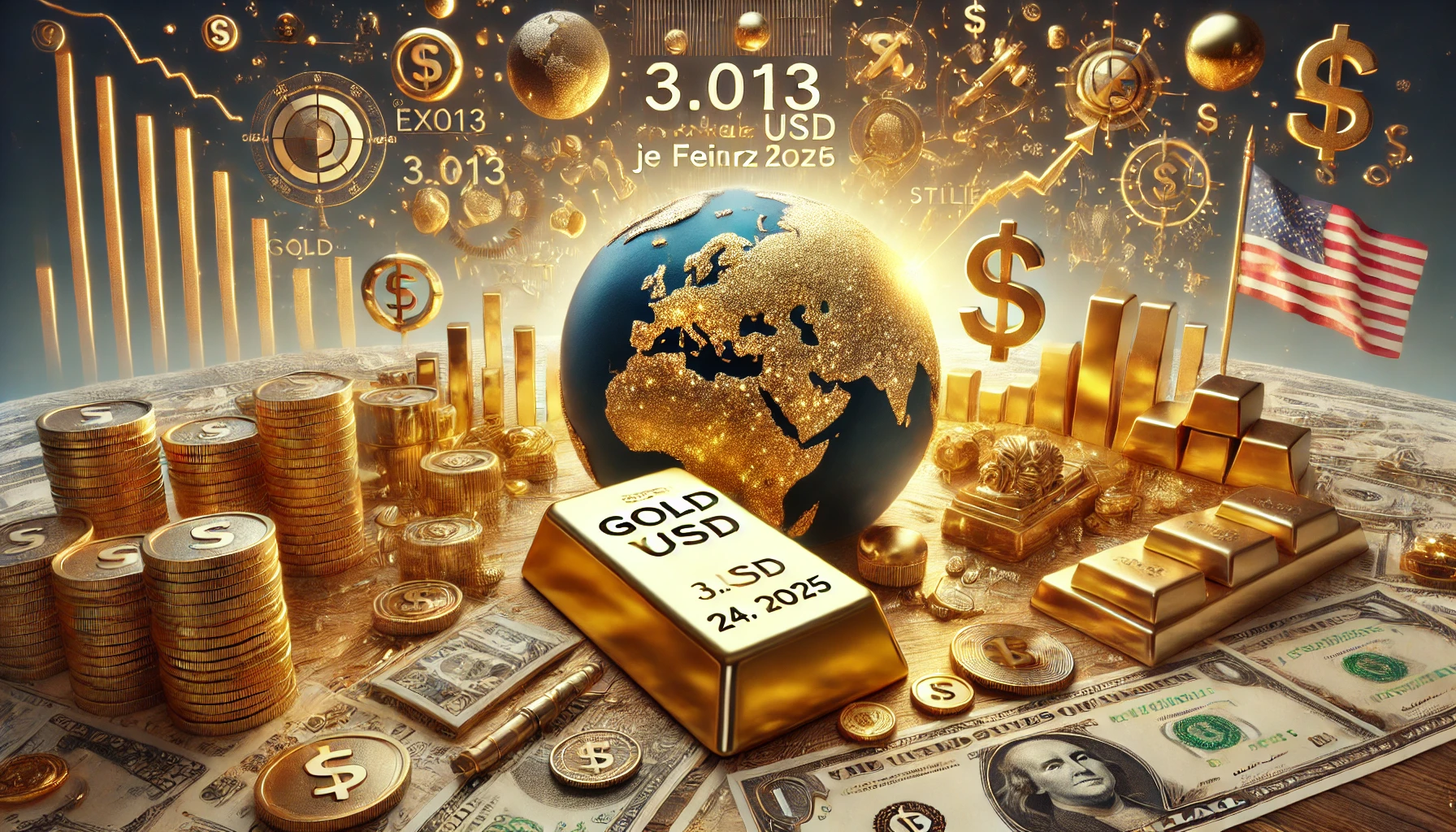Table of contents
Economy & Markets
Gold in the geopolitical chess game
Dr. Mathias Kunze
Senior Consultant in Commercial and Tax Law
8 min.
Published on: 16.09.2024 | 11:37 UTC
Updated on:
20.09.2024 | 09:20 UTC

Gold price rises in the wake of geopolitical tensions and global crises
Source: ChatGPT (OpenAI)
On September 16, 2024, the price of gold reaches an all-time high of 2,580.00 USD per troy ounce, driven by global crises and growing uncertainty in the financial markets. As geopolitical tensions escalate and central banks realign their currency reserves in a historic move, the precious metal continues to move to the center of international financial strategies. But the supposed stability of gold is only the surface of a complex game whose deeper consequences could permanently shake the global balance.
Gold price at record level: What is driving the markets?
On September 15, 2024, the price of gold reached a record high of 2,577 USD per troy ounce. This impressive development is the result of several factors shaping global financial markets. The European Central Bank's interest rate cut of 25 basis points to 3.75%, aimed at combating the ongoing economic weakness in the eurozone, played a decisive role. This easing of monetary policy, which follows similar measures in June 2024, has further boosted the price of gold.
In the US, too, signals are strengthening that are further driving up the price of gold: the Federal Reserve is on the verge of cutting interest rates, while current economic data such as the rise in initial jobless claims and the producer price index point to sustained inflationary pressure. These developments have pushed US Treasury yields lower and weakened the dollar, making gold even more attractive as an investment.
Global crises drive the gold price
Geopolitical crises, including in particular the ongoing war in Ukraine and growing tensions between the US and China, have had a significant impact on the gold price. Since the beginning of the war in Ukraine, many investors have been investing more in gold as protection against financial and political uncertainty. The Geopolitical Risk Index (GPR) illustrates this development: a 100-point increase on the index can cause the gold price to rise by around 2.5%, as geopolitical risks such as military conflicts and sanctions increase the demand for safe investments.
Russia has massively expanded its gold reserves in order to circumvent Western sanctions and reduce its dependence on the US dollar. At the same time, other countries, particularly in Asia, are also turning to gold as a safe haven investment. This development is being reinforced by the de-dollarization being pushed by countries such as China and Russia. The increasing formation of blocs in the international financial world is also contributing to gold's growing importance as a stabilizing element in central bank reserves.
These geopolitical uncertainties are keeping the price of gold at a record level and reflecting the fragile global political situation.
Central banks' global gold purchases: a race for stability
Central banks around the world are stepping up their gold purchases to increase the stability of their currency reserves and counter geopolitical risks. China and Russia, in particular, are taking a leading role in this strategy. Russia has greatly increased its gold holdings since the beginning of the war in Ukraine in order to circumvent sanctions and reduce its dependence on the US dollar. However, gold is not only used for stabilization purposes, but also as a strategic tool in international trade with partners such as China and Iran.
China is also focusing more on gold as part of its long-term de-dollarization strategy. The Chinese central bank has continuously expanded its gold reserves to promote financial independence and hedge against possible global currency crises. This strategic accumulation of gold aims to strengthen confidence in its own currency and gain geopolitical influence.
This trend is not limited to Russia or China, but can be seen worldwide: most central banks increasingly view gold as an indispensable tool for hedging against economic and political instabilities. The weakening of the US dollar and the uncertainties in the global financial markets contribute to the attractiveness of gold as a reserve currency.
Interest rate cuts make gold more attractive to investors
The interest rate policy of the major central banks plays a central role in the current development of the gold price. Both the European Central Bank and the US Federal Reserve are signaling a loosening of their monetary policy. The ECB had already cut interest rates by 25 basis points at the end of last week to support the stagnating economy in the eurozone. This measure immediately caused the price of gold to rise significantly, as lower interest rates make the precious metal more attractive as an investment.
In the US, the Fed is expected to make a similar decision soon. Despite stubborn core inflation, weaker economic data such as rising initial jobless claims and the producer price index are fueling expectations that the Fed will soon cut interest rates.
Falling US Treasury yields and a weaker dollar are also contributing to investors turning to gold investments. Since gold does not generate interest, investors in a low-interest environment benefit more from its appreciation, which further strengthens the demand for the precious metal.
A radical change is looming: the global consequences of gold strategies
The current geopolitical and economic situation, coupled with the increasing turn of many countries to gold, has profound and far-reaching consequences for the global financial system. These developments are an expression of a fundamental realignment, the effects of which could change both international markets and the political balance of power in the long term.
The new world order: bloc formation and the end of dollar dominance
The increasing bloc formation between the West and emerging powers such as China and Russia are a defining feature of the current world economy. This division, which is being reinforced by sanctions and economic conflicts, has led to increased de-dollarization. Countries such as China and Russia are pursuing targeted strategies to reduce their dependence on the US dollar and are increasingly turning to gold. In particular, Russia has significantly expanded its gold reserves in response to Western sanctions in order to stabilize the economy and strengthen alternative trade relations.
De-dollarization is not only a sign of geopolitical power shifts, but also has the potential to weaken the dominance of the US dollar as a global reserve currency in the long term. Such a development would profoundly change international trade relations and financial markets. Countries that rely on gold as a currency reserve could become less dependent on dollar exchange rate fluctuations in the long term and strengthen their economic sovereignty.
Gold as a weapon: currency wars and the shift in global power relations
With the increasing importance of gold in the international monetary system, currency wars could also intensify. Countries seeking to free themselves from the dominance of the US dollar are replacing fiat currencies with gold in order to diversify their trade relations and reduce their dependence on Western financial institutions. This is leading to a shift in the balance of power in the global financial system, in which traditional Western actors such as the US and the Eurozone could lose influence.
Russia's gold strategy, which trades through alternative networks, weakens Western sanctions and strengthens Russia's position in the global economy. At the same time, China and Russia are using the precious metal to expand their economic influence in regions such as Africa and Central Asia. This shift of power towards emerging markets, which are decoupling from Western currencies and financial systems, poses a threat to the previous balance of the world economy.
Volatile markets: the role of gold in times of rising volatility
One of the immediate consequences of geopolitical tensions and the shift away from the US dollar is the increasing volatility in global financial markets. The massive rise in the price of gold reflects the growing uncertainty triggered by unstable geopolitical conditions. Investors are increasingly looking for safe havens, which not only increases demand for gold but also weighs on markets for other asset classes such as equities and bonds.
As gold is increasingly seen as a stable store of value, this could make other assets less attractive. Falling bond yields and rising inflation expectations reinforce this dynamic. Particularly in times of economic uncertainty, liquidity flows out of riskier asset classes and into the gold market. This could lead to a long-term shift in capital flows and fundamentally change the structure of global financial markets.
Inflation and interest rate policy: Why central banks are betting on gold
Increased demand for gold in connection with global inflation and central banks' interest rate cuts could further destabilize the global financial system. The Federal Reserve and the European Central Bank face a difficult dilemma: on the one hand, they must contain inflation, but on the other, they must not slow down the economy by raising interest rates too much. This could mark the beginning of a global monetary policy race to the bottom, putting further pressure on the stability of the financial markets.
In this environment, gold benefits as an interest-free investment. As yields on government bonds fall and interest rates drop, gold becomes increasingly attractive, further boosting demand. This trend could erode confidence in paper currencies over the long term and further strengthen the importance of gold as a central reserve currency.
A new financial system? Long-term consequences for the world economy
The long-term consequences of these developments could mean a profound realignment of the global economy. The increasing formation of blocs between the West and emerging economic powers – coupled with the shift away from the US dollar and the growing importance of gold – could lead to a multipolar financial system. In this scenario, countries that rely on gold as a stable currency could strengthen their economic sovereignty. At the same time, the importance of Western financial systems could decline.
In addition, the decoupling from Western currencies could lead to a fragmentation of global markets, with the emergence of different currency blocs. As a result, a deeper uncertainty would develop in the financial markets, characterized by increased volatility and constant shifts in capital flows. In this new world order, gold could play an even more central role: both as an investment and as a political instrument.
Gold in the geopolitical power game: an outlook
Gold will continue to gain in importance in the coming years, as geopolitical tensions and the ongoing shift away from the US dollar, particularly in countries such as China and Russia, strengthen its role as a reserve currency. At the same time, monetary easing and economic uncertainty in the US and the eurozone continue to support the price of gold. In this unstable global environment, gold is not only valued as a safe store of value, but could play an even more central role in the international financial system over the long term.
Dr. Mathias Kunze
Senior Consultant in Commercial and Tax Law
Blog

All-time high: Gold price breaks through USD 3,000 for the first time

Gold in industry: A detailed analysis of its interactions with halogens and in cyanide solutions







